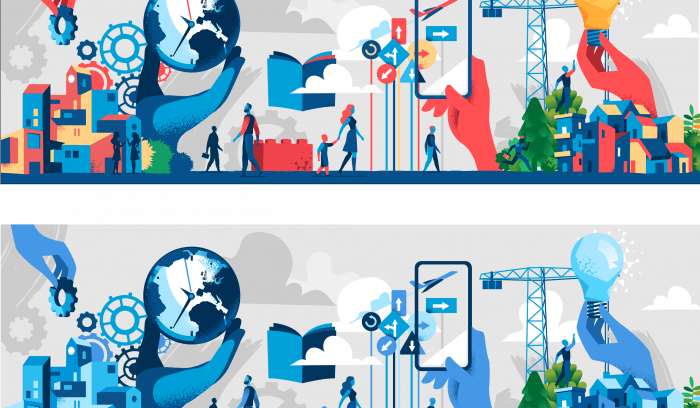The future has arrived — the future of work, that is. Over the next few years, emerging trends will accelerate and become entrenched, forever changing the way that companies hire, train, and retain employees. With more pronounced shifts toward changes and trends — some exacerbated by the COVID-19 pandemic — companies should read up on what the future of work entails and how to hire for it.
What Is the Future of Work?
None of the trends that will define the future of work are entirely new, but they will become more and more pronounced with each passing year. For one, workers in the corporate and tech worlds have come to expect flexibility in terms of both hours and location.
This trend was already happening before the COVID-19 pandemic and became more entrenched as companies instituted remote work policies. Indeed, remote work will continue to be a staple for the foreseeable future, especially as the pandemic continues to ebb and flow.
Similarly, hybrid offices will likely grow in popularity over the next few years once the pandemic finally begins to fade. Not everyone likes working from home 24/7, but many don’t want to return to the office full-time either, and hybrid offices satisfy this middle ground.
Another trend that will define the future of work is changing industry needs. Due to developments in technology and automation, certain highly-manual or repetitive jobs are becoming obsolete, but new opportunities are emerging to replace them. These new jobs will require retraining and up-skilling a significant portion of the labor force.
The labor market will likely continue to remain competitive for the foreseeable future. This puts pressure on employers to make attractive job offers in order to stand out among the competition. It’s no longer enough to simply offer someone a job or even a great compensation package; candidates are also looking for company culture that aligns with their personal values. Thus, company culture will prove key to retention in the coming years as well.
What Impact Will Automation Have on Work?
In the coming years, opportunities to implement automation will continue to accelerate as the technology improves. More and more rote tasks such as data entry will be taken over by automated software, contributing to those industry-wide labor force changes.
This increase in automation will naturally cause certain jobs to become obsolete. However, it will also open up new jobs for skilled employees to program and train the AI (artificial intelligence) software as well as to design and upgrade any accompanying hardware.
Automation will also change the way that people are hired. Already, automated recruiting software is beginning to take over parts of the hiring process, such as sourcing candidates and even asking initial screening questions. Recruiting AI can also help with taking notes during interviews and other basic tasks to free up recruiters’ time and attention for more high-value jobs.
Automated recruiting software is especially helpful in high volume hiring situations. Companies that need to hire a large volume of workers and/or experience a lot of turnover will increasingly turn to recruiting AI to help speed up the hiring process and make it more efficient.
What About Upskilling Current Employees?
With the labor market being so competitive, companies won’t simply be able to recruit from the new candidate pool. As technological developments accelerate, the demand will, and is already beginning to, outstrip the supply.
This means that companies will need to develop current training programs that can help upskill current workers instead of focusing all their efforts on recruiting new employees. In many cases it’s more cost effective to re-train current workers than it is to hire new ones; hiring people is expensive and time consuming and results in a lot of lost productivity while you wait for the position to be filled.
Upskilling programs do take time and effort to create, but this upfront investment needs to be weighed against the opportunity cost of hiring in a very competitive market. Upskilling programs can also be a major component of retaining current employees and reducing turnover. If employees are assured of additional training and likely a company or industry change, they will be likely to accept the offer and stick with the company.
Also read: Recruiting Challenges Will Be Heightened By Hybrid Work
However, not every employee will be able to successfully upskill — a 100% success rate simply isn’t possible, especially at larger companies with a more varied workforce. Therefore, companies also need a plan in place to diplomatically let them go and potentially to provide placement resources to help them find a new job.
How Much Will These Trends Impact Future Hiring?
There’s no denying that adaptation is hard. Older companies may be tempted to ignore these developing trends and just keep doing what they have always done. After all, it worked in the past, so why wouldn’t it keep working?
However, all signs point to the labor market remaining competitive, with candidates having the advantage. This means that employers must adapt if they want to keep hiring the best candidates instead of watching them all accept jobs with competitors. Doing the bare minimum is no longer enough to get candidates to sign offer letters.
Certain changes will also take time to implement, such as AI software and upskilling programs. If employers wait to implement these tools until everyone else is doing it, then the company will already be behind the curve. To get ahead of the future of work, employers need to be proactive and start planning for it now instead of waiting.
Ready to prepare your business for the future of work? The unbiased experts at TechnologyAdvice can help you find the perfect tools for your business, whether you need automated recruiting software or video conferencing tools. Contact us today for your free consultation to begin preparing your company for the future of work.

